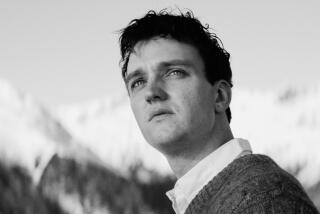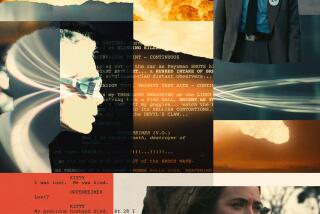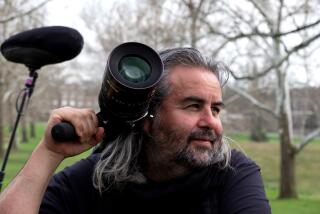TV Reviews : ‘Einstein’: A Must for the Videotape Library
- Share via
In one of the most astonishing and poetic compressions of grand ideas ever managed in one hour of television time, “A. Einstein: How I See the World,” part of PBS’ “American Masters” series (at 10 tonight on KCET Channel 28; 9 p.m., KPBS Channel 15), shows that the most crucial of the 20th Century’s unpredictably tragic and sublime events was set off by one man: Albert Einstein.
Writer-director Richard Kroehling and his co-writer, Laura Nathanson, bring fresh insight to the life story of the man who has become so institutionalized as a grandfatherly figure of modern science.
In a manner Einstein would have enjoyed, biographical time is bent on more than one occasion. In fact, there is nothing conventional in the telling here, including William Hurt’s understated narration. Though Kroehling and Nathanson are ostensibly concerned with Einstein’s bittersweet years in the United States, they track back to the earlier European period.
He was the quintessential “wandering Jew,” renouncing German citizenship at 17, laboring in a Swiss patent office in 1905 when he arrived at his controversial relativity theory--the first redefinition of the universe since Newton (a priceless clip of George Bernard Shaw, comparing the two revolutionary scientists, alone makes “How I See the World” a must for the tape library).
Einstein is resolutely not deified, as Kroehling and Nathanson dwell on his intellectual blind spot toward physics’ next phase after relativity: Heisenberg’s “uncertainty principle” and quantum mechanics.
Still, he becomes a tragic hero, from his extraordinary flight from the Nazis (his summer home became an Aryan youth camp) to his fateful 1939 decision to alert Franklin Roosevelt of the need to develop an atomic bomb to counteract the impending Nazi atomic threat. Never has a thinker’s pacifism been as mangled and ironically turned inside out as Einstein’s.
The interweaving of his erratic personal life--mixing an ascetic lifestyle, divorce and Hollywood premieres--with his scientific and political lives appears so effortless in the film that only later, after it’s over, do you realize what an epically difficult, arduous existence Einstein led. Yet, as we’re reminded, he never took time seriously. Froehling and Nathanson recover Einstein’s time and--with Michael Galasso’s unforgettable minimalist music score--enter Einstein’s mind with great personal style.
More to Read
The complete guide to home viewing
Get Screen Gab for everything about the TV shows and streaming movies everyone’s talking about.
You may occasionally receive promotional content from the Los Angeles Times.






